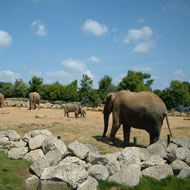
Method already in use at captive elephant facilities across the UK
Researchers at the University of Nottingham have developed a tool to help zookeepers monitor the wellbeing of elephants in their care.
The Elephant Behavioural Welfare Assessment tool is the culmination of research published in PLOS ONE and allows keepers to track the welfare of individual elephants based on their demeanour and welfare.
The tool is already in use at captive elephant facilities across the UK, helping keepers to monitor the impact of changes in animal husbandry and develop facilities that are designed to enhance animal welfare.
Zoo and wildlife medicine lecturer Dr Lisa Yon, who led the research, said: “Our new tool provides, for the first time, a reliable way for people looking after captive elephants to use the elephants’ behaviours to monitor their welfare over time.”
The tool is to be completed by the keeper and consists of four one-minute live observational assessments, daytime behaviour questions and nighttime observations.
It was initially tested at five elephant holding facilities in the UK on a total of 29 elephants - representing alomst half of the total UK captive population at the time.
Based on the testing results, the finalised Elephant Behavioural Welfare Assessment tool was developed and is now included in the Secretary of State’s Standards of Modern Zoo Practice Guidelines as a routine part of the welfare assessment of captive elephants across the UK.
Researchers suggest that a similar method could also be employed for other species in zoos and aquariums.



 The latest
The latest